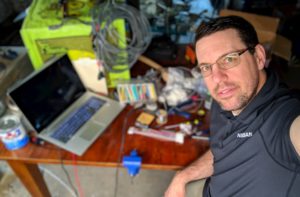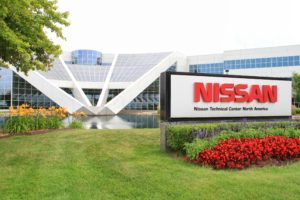
Engineers persevere pandemic via remote offices
By Stephen Law, Editor EP&T
Electronics Engineering automotive automotive design Design electronics Electronics engineering engineering harness harness Nissan Nissan wire wireThis unprecedented time has changed how tech approaches the topic of innovation
Like much of North America’s professional workforce amid the COVID-19 pandemic, many employees are fortunate enough to be able to work remotely from a home office. Those involved directly in the fields of electronic engineering or design work would agree that doesn’t make their job any easier, but it can have some creative benefits.

Jeremy Chambers, Nissan Technical Centre North America, set up a wire harness lab at home in hi sbasement during COVID-19 lockdown.
Just ask Bob Flotkoetter, director of technology planning & research at Nissan Technical Center North America (NTCNA), which supports design and development of all Nissan and INFINITI vehicles sold in North and South America. His role spans research and advanced engineering in areas such as vehicle-to-vehicle / vehicle-to-infrastructure communication, autonomous vehicles, battery, fuel cell and advanced manufacturing.
Facility resides near Canadian border
All of his design team has been situated in remote home offices since March 16th, which can bring some challenges and opportunities. Situated on 55-acres of land in Farmington Hills MI, the NTCNA employs 1,200, while 80% of staff are involved with research and development. With the facility residing so close to the Canadian border, many of the engineering team members are from Canada.

Bob Flotkoetter, director of technology planning & research at Nissan Technical Center North America (NTCNA).
“Many of our engineers have been afforded the time to go deep into hypothesizing different design options, unlike before, where a good portion of their day may have been spent commuting, etc.”, says Flotkoetter. “I know some of my team members have already come up with some ideas for intellectual property and patents that have just kinda bubbled up from this very interesting time that we are facing right now. They have been able to conduct really deep work and reflection on some analysis they might not have otherwise had the chance to do before.
Flotkoetter is trying to maintain a ‘business as usual’ process, following the mantra of “same mission – different approach.”
Set up wire harness lab in basement
One of Nissan’s engineers involved directly with the design of wire harnesses builds for a prototype vehicle remained undeterred by the loss of his normal elbow room at NTCNA. With some improvisation, wiring specialist Jeremy Chambers packed up all the equipment he needed to do his job and set up a home laboratory in his basement. Taking with him all the (wire) leads and crimping tools, along with all of the documentation to do it.
“He managed to carry on like that along with regular communication with fellow engineers involved with the project. Any kind of direct conversations can be handled over Zoom (teleconferencing),” says Flotkoetter.

Nissan Technical Centre North America – Farmington Hills MI .
Road tests easier
The remote nature of testing has also been extended into actual road vehicle testing, made easier due to the reduced traffic volumes in all towns and cities today. Some audio test engineers have had to make their home driveways a test studio, much to the chagrin of some neighbours hearing intermittent blaring of car radio speakers.
Depending on team sizes, complexities and production schedules, meetings between most parties can be held daily or weekly, says Flotkoetter. He says the flow of projects are moving smoothly, as the internal metrics tracked by NTCNA received a high rating on issue resolution. Collaboration with suppliers is also conducted on a daily basis, as not all are operating at full capacity.
Communication is key
“By staying on top of these relationships, we have been able to stay on track of all the milestones we set out, and we are working towards ensuring that we don’t allow the unique work environment to cause any delays for us,” he adds.
Flotkoetter anticipates that the unique COVID pandemic environment will actually spawn innovation once things settle down.
“I anticipate a heightened sense of awareness for personal hygiene and sanitation within the automotive sector, as a result of this. If there is one thing this experience has taught us is – it is important to be open to change – to embrace change. We are going to look back at this moment and pull out the good points and the improvement points, and it may redefine the way we conduct our business in the future.
